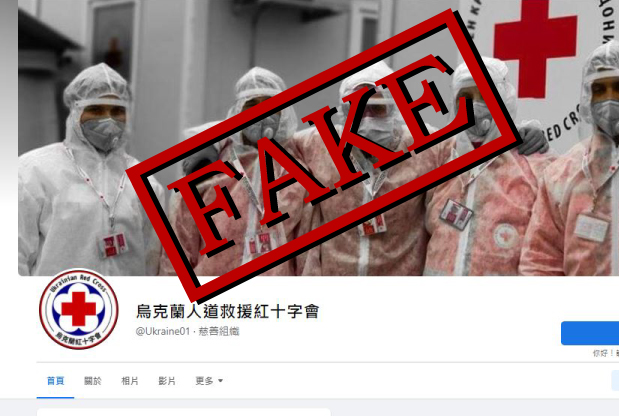At a time when the situation in Russia and Ukraine aroused concern, the Taiwan authorities were "rubbing" happily, and the scammers on the island also began to take the lead one after another: after some people pretended to be "Ukrainian female doctors" and "Ukrainian officers" to cheat money, there were accounts posing as "Ukrainian Humanitarian Red Cross" to defraud donations...
According to Taiwan's United News Network reported on March 19, the Taiwan Red Cross Society issued an article on the 18th that fraudsters have recently raised funds in the name of the "Ukrainian Humanitarian Rescue Red Cross" on Facebook, and the Taiwan Red Cross Society has called the police to deal with it.

The Taiwan Red Cross Society recently announced that due to the influx of Ukrainian refugees into Poland, the Taiwan Red Cross Society has donated 1,700 boxes and more than 240,000 pieces of materials to the Red Cross Society in Poland and other places.
On March 18, the Taiwan Red Cross Society issued a statement saying that the Society recently found on Facebook that a fraud group fraudulently used the "Ukrainian Humanitarian Rescue Red Cross" to raise funds to the public, requiring netizens on the island who intended to donate privately to send a private message to the editor of the "relief special account information", and asked the public to add the account editor as a friend in the chat software.
The fraud syndicate continued to lure the Taiwan people into donating money through private messages. The screenshot shows that the scammers said that the relevant donations would "help Ukrainian refugees tide over the difficulties", and falsely claimed that they would provide donation details within 5-10 working days after receiving the donation, and also asked Taiwan netizens who intended to donate money to send money to the Taiwan account first.
Wang Qingfeng, president of the Taiwan Red Cross Society, said that the Taiwan Red Cross Society has called the police to deal with the lawbreakers' tactics of taking advantage of the opportunity to deceive the public. The association also called on the Taiwan people to find out the relevant information of various non-profit organizations before donating money.
In fact, after the escalation of the Conflict between Russia and Ukraine, there has been more than one scam on the island.
According to Taiwan media reports on March 14, a fraud group pretended to be a "Ukrainian female doctor", saying that it wanted to charter a plane to take refuge in Taiwan, borrowing $90,000 from a 70-year-old man in Pingtung, who was stopped by sharp-eyed staff and called the police when he went to the bank to remit money.
On March 16, there was also a "Ukrainian officer courtship and money fraud" incident on the island, the victim was a 68-year-old woman surnamed Zhuang in Chiayi County, she met a man who claimed to be an officer in Ukraine on the dating app, and on the afternoon of the 14th, in accordance with the requirements of the "Ukrainian officer", went to the post office to send money, and was stopped and called the police after the post office staff found that something was wrong.
Regarding the incident of taking advantage of the situation in Ukraine to defraud, Taiwan netizens angrily and bluntly said: "This is what the global fraud center - Taiwanese people will do!" ”
This article is an exclusive manuscript of the Observer Network and may not be reproduced without authorization.